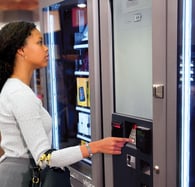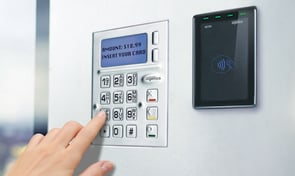 The use of credit cards in the US is rising and new payment options such as Apple Pay, Android Pay, etc. are gaining popularity. In the midst of this payment evolution, industries using unattended kiosks or vending machines that don’t take all card types or forms of payment can be at a disadvantage. According to a recent study, cashless payments when compared to cash payments, contributed directly to positive sales development in the vending industry.
The use of credit cards in the US is rising and new payment options such as Apple Pay, Android Pay, etc. are gaining popularity. In the midst of this payment evolution, industries using unattended kiosks or vending machines that don’t take all card types or forms of payment can be at a disadvantage. According to a recent study, cashless payments when compared to cash payments, contributed directly to positive sales development in the vending industry.
As we move forward, consumers paying at parking meters, vending machines or pharmacy pickup windows, will start to expect the convenience of multiple payment options such as credit cards, NFC-based mobile payments, etc. This means businesses should upgrade their payment technology for unattended environments to align with current payment standards and consumer demands.
 However, before upgrading your kiosk or vending machine, it’s critical to make sure you’re incorporating all of the necessary components, features, and capabilities to future proof your payment infrastructure. Let’s take a look at seven things to keep in mind while implementing a new unattended payment solution:
However, before upgrading your kiosk or vending machine, it’s critical to make sure you’re incorporating all of the necessary components, features, and capabilities to future proof your payment infrastructure. Let’s take a look at seven things to keep in mind while implementing a new unattended payment solution:
1. EMV
With the EMV liability shift deadline having passed in the US, it has become imperative for merchants to upgrade their payment technology to comply with the new standard or to match consumer expectations. This also applies to unattended environments such as vending machines, kiosks, and other forms of self-service. As consumers become more accustomed to using EMV cards elsewhere and begin to understand its benefits in terms of security, they will start expecting the same experience when going to checkout at a kiosk, vending machine, or other self-service payment devices. Business owners who have invested in unattended payment solutions should upgrade their technology to accept EMV chip cards for the same reasons attended merchants do – so guard themselves against credit card fraud.
2. NFC
Consumer adoption of secure near field communication (NFC) technology, such as Apple Pay, Android Pay, and Samsung Pay is also on the rise, and unattended payment solutions need to adapt. NFC technology is expected to bring about a behavioral change among consumers and help drive people to begin using their smartphones to pay for goods and services. By upgrading your unattended payment solutions to accept NFC payments, you can keep up with consumer demand and the evolving payment landscape.
3. Closed-Loop Cards
Closed-loop cards are gift or credit cards that can only be used at a specific merchant or location. Enabling acceptance of closed loop cards within unattended payment environments provides customers with the option to redeem these cards even when they’re not interacting with a store employee or at the standard checkout counter. This encourages greater impulse purchases and allows consumers to leverage the merchant’s loyalty programs in order to receive rewards, offers and discounts on an ongoing basis. By enabling closed-looped card acceptance in these unattended environments, you can help strengthen customer loyalty and increase repeat business.
4. Ease of Integration
Every unattended solution, whether it is a vending machine, a ticketing kiosk, a retail pharmacy dispenser, or a parking meter, involves many different technologies, and often many different players. For example, a retail kiosk may include components or services from an enclosure or kiosk provider, payment acceptance provider, software developer, system integrator, value-added service provider, gateway provider, and more. System Integrators or Value Added Resellers (VARs) are typically the ones that bring all of these individual elements together to form a complete solution that meets the unique business needs of specific merchants, industries and market segments. It’s imperative for unattended payment solutions to be easy to integrate with and to fit seamlessly into whatever environment or setting the solution is being designed to address.
5. Timely Updates
Vending machines, kiosks, and other unattended solutions have built-in software that enables the payment technology to function. Like most other software, these too need to be updated from time to time. Vending machines or kiosks that don’t work properly can be a major inconvenience and will deter consumers from becoming repeat customers. To address this issue, you should look for a solution that leverages estate management software, allowing you to perform updates or adjust configurations to the payment device remotely without having to schedule a technician visit.
6. Durability
Unattended payment solutions go through a lot of wear and tear. Thousands of people use these self-service solutions on a regular basis, while some environments, such as outdoor parking systems or ticketing kiosks, are also exposed to weather elements that can potentially damage the machines. It’s important to have a robust and durable solution that can withstand these conditions by meeting ingress protection (guard against environmental elements such as water, dust, etc.) and shock (impact/ force) protection standards.
7. Payment Security
Customers are also concerned about security. Those who buy big-ticket items from vending machines, like tablets, mobile accessories, smartphones and pharmaceutical products, must be certain that there won’t be any foul play from cybercriminals while completing these sizable transactions. Many payment solution providers also offer additional security measures such as point-to-point encryption (P2PE) and tokenization. P2PE helps protect the card data from cybercriminals as it travels from the point of payment through authorization and tokenization helps protect the card data while its stored in back-end systems.
 As consumers become more comfortable with technology, they expect payment options that align with their individual purchasing preferences. According to Growth Industry Analysts, the US is the largest market for intelligent vending machines and the global market is expected to grow to 2.7 million intelligent unattended terminals by 2020, many of which will offer cashless payment options. By complying with the latest EMV standards and providing customers with multiple payment options within unattended environments, you can give your customers exactly what they want: a fast, convenient and secure way to pay that enhances their overall purchasing experience. Get more information on our unattended partner program to learn how you can get started.
As consumers become more comfortable with technology, they expect payment options that align with their individual purchasing preferences. According to Growth Industry Analysts, the US is the largest market for intelligent vending machines and the global market is expected to grow to 2.7 million intelligent unattended terminals by 2020, many of which will offer cashless payment options. By complying with the latest EMV standards and providing customers with multiple payment options within unattended environments, you can give your customers exactly what they want: a fast, convenient and secure way to pay that enhances their overall purchasing experience. Get more information on our unattended partner program to learn how you can get started.
Bruce Rasmussen, Director of Sales, Strategic Verticals, North America / Ingenico Group










